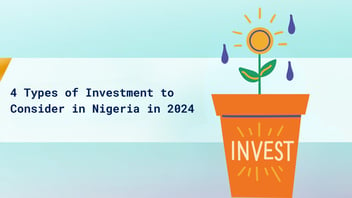
What are Fixed Income Securities in Nigeria?
Author Taiwo Temitope-Adesope
Fixed-income securities are debt instruments issued by governments, corporations, and other entities, promising investors regular interest payments and the return of their invested principal at maturity. In Nigeria, these securities play a crucial role in the financial market, offering investors a range of options to diversify their portfolios and earn predictable returns.
The relevance of fixed-income securities in Nigeria cannot be overstated. They provide a stable source of income for individuals, institutions, and pension funds, while also serving as a tool for governments and corporations to raise capital for various projects and operations.
As the Nigerian economy continues to grow and mature, the demand for these securities is expected to increase, making it essential for investors to understand their characteristics and potential benefits.
Q3 2025 Market Overview
Nigeria's fixed-income market has transformed dramatically with the CBN's aggressive monetary policy. Current yields represent the highest levels in over a decade, making fixed income securities the star performers of 2025.
Current Market Snapshot:
- Treasury Bills: 18-20% yields across all tenors
- FGN Bonds: 18-22% for long-term securities
- Corporate bonds: 20-25% for high-grade issuers
- Money market funds: 20-24% gross yields
Types of Fixed Income Securities in Nigeria
- Government Bonds: These are debt instruments issued by federal, state, and local governments in Nigeria. They are generally considered among the safest fixed-income securities due to the creditworthiness of the issuing government entities. Government bonds in Nigeria come with varying maturities, ranging from short-term to long-term, allowing investors to choose options that align with their investment horizons.
- Treasury Bills: Issued by the Nigerian government, treasury bills are short-term debt instruments with maturities of less than a year. They are considered low-risk investments and are often used by investors seeking short-term, low-risk returns or as a temporary parking spot for their funds.
- Corporate Bonds: Companies in Nigeria can issue corporate bonds to raise capital for various purposes, such as expansion, debt refinancing, or general operating expenses. While corporate bonds offer the potential for higher returns compared to government securities, they also carry a higher degree of risk, as the creditworthiness of the issuing company plays a significant role in determining the bond's yield and overall performance.
- Commercial Papers: These are short-term, unsecured debt instruments issued by corporations in Nigeria. Commercial papers typically have maturities ranging from a few days to one year and are often used by companies to meet their short-term financing needs.
- Other Fixed-Income Securities: In addition to the aforementioned securities, the Nigerian market offers other fixed-income options, such as Eurobonds (bonds issued in a currency other than the Nigerian naira) and Sukuk (Islamic bonds structured to comply with Sharia principles).
Key Features of Fixed Income Securities
- Maturity Date: Every fixed income security has a predetermined maturity date, which is the date when the principal amount invested is repaid to the investor. Maturities can range from a few days to several decades, allowing investors to choose securities that align with their investment goals and time horizons.
- Coupon Rate: The coupon rate is the fixed interest rate paid on the security at regular intervals (e.g., semi-annually or annually). This rate is established at the time of issuance and remains constant throughout the security's lifetime, providing investors with a predictable stream of income.
- Credit Rating: Credit rating agencies, such as Fitch, Moody's, and S&P, assess the creditworthiness of issuers and assign ratings to their fixed-income securities. These ratings indicate the issuer's ability to repay the debt and help investors gauge the level of risk associated with a particular security.
- Yield: The yield of a fixed-income security represents the return an investor can expect to earn from holding the security until maturity. It is calculated based on the security's price, coupon rate, and maturity date. Generally, higher-risk securities offer higher yields to compensate investors for the increased risk.
Benefits of Investing in Fixed Income Securities in Nigeria
- Predictable Income: One of the primary advantages of fixed-income securities is the regular interest payments they provide. This predictable income stream can be particularly appealing for investors seeking a stable source of cash flow, such as retirees or those with specific income requirements.
- Capital Preservation: Unlike equity investments, fixed-income securities offer a higher degree of capital preservation, as the principal amount is typically repaid at maturity. This feature can be attractive for risk-averse investors or those nearing retirement who prioritize protecting their invested capital.
- Portfolio Diversification: Incorporating fixed-income securities into an investment portfolio can help reduce overall risk through diversification. These securities tend to have a low correlation with other asset classes, such as stocks, which can help mitigate the impact of market volatility on an investor's portfolio.
- Potential for Capital Appreciation: While fixed-income securities are primarily known for their income generation potential, they can also offer opportunities for capital appreciation. If interest rates fall after an investor has purchased a fixed-income security, the value of that security may increase, allowing the investor to potentially sell it at a higher price and realize capital gains.
Risks of Investing in Fixed Income Securities in Nigeria
- Interest Rate Risk: As interest rates rise, the prices of existing fixed-income securities tend to fall, as newly issued securities with higher coupon rates become more attractive to investors. This inverse relationship between interest rates and bond prices can result in capital losses for investors holding fixed-income securities with longer maturities.
- Inflation Risk: Inflation can erode the purchasing power of fixed-income returns over time. If the rate of inflation exceeds the coupon rate of a fixed-income security, the real (inflation-adjusted) return on that investment may be negative, effectively diminishing the investor's purchasing power.
- Credit (Default) Risk: Credit risk, also known as default risk, refers to the possibility that the issuer of a fixed-income security may fail to make timely interest payments or repay the principal amount at maturity. This risk is typically higher for corporate bonds and lower for government-issued securities, as governments are generally seen as more creditworthy borrowers.
How to Invest in Fixed Income Securities in Nigeria
- Primary Market: Investors can purchase fixed-income securities directly from issuers during the initial offering, known as the primary market. This can be done through authorized dealers, such as banks or stockbrokers, who act as intermediaries between the issuer and the investor.
- Secondary Market: After the initial offering, fixed-income securities can be bought and sold on the secondary market, which includes exchanges like the Nigerian Stock Exchange (NSE) and over-the-counter (OTC) markets. Investors can trade securities through licensed stockbrokers or other financial intermediaries operating in these markets.
- Investment Platforms: In recent years, online investment platforms and fintech companies in Nigeria (e.g., CowryWise, Trove) have made it easier for individual investors to access fixed-income securities. These platforms often offer a range of fixed-income products, including government bonds, treasury bills, and corporate bonds, along with educational resources and portfolio management tools.
To get started with investing in fixed-income securities in Nigeria, you can visit platforms like nairacompare.ng to compare different options or consult with licensed stockbrokers, asset management firms, or financial advisors who can guide you through the process and help you make informed investment decisions.
Digital Access Revolution (2025)
Traditional Barriers Removed:
- Minimum investments reduced from millions of naira to N10,000
- Mobile apps enable instant purchases
- Secondary market trading via digital platforms
Leading Platforms:
- I-Invest: N10,000 minimum for T-bills
- Commercial bank apps: Direct government security purchases
- Asset management platforms: Professional fund access
Conclusion
Fixed-income securities play a vital role in the Nigerian financial market, offering investors a diverse range of options to generate predictable income, preserve capital, and diversify their portfolios. From government bonds and treasury bills to corporate bonds and commercial papers, these securities cater to various investment objectives and risk appetites.
While fixed-income investments are generally considered less risky than equity investments, investors need to understand the potential risks, such as interest rate risk, inflation risk, and credit (default) risk. Conducting thorough research, seeking professional guidance, and carefully considering one's investment goals and risk tolerance are crucial steps in navigating the fixed-income landscape in Nigeria.
By incorporating fixed-income securities into a well-diversified investment portfolio, Nigerian investors can potentially achieve a balance between risk and reward, while benefiting from the stability and predictability these securities offer. As the Nigerian financial market continues to evolve, the significance of fixed-income securities is expected to grow, providing investors with a reliable avenue for achieving their financial objectives.
About Author

Taiwo Temitope-Adesope
Taiwo is a passionate storyteller and strategist dedicated to empowering women and crafting compelling narratives. A First-Class graduate in Mass Communication from Covenant University, she specializes in writing, public relations, and digital marketing. As a Content Manager at Suretree, she drove a 50% increase in web traffic through SEO and boosted website engagement by 60% in just four months. Her leadership experience includes serving as Public Relations Officer for the Covenant University Student Council and contributing to impactful volunteer initiatives. With expertise in strategic thinking and business acumen, Taiwo continues to create stories that inspire confidence and imagination.










.jpg?width=352&name=What%20is%20Forex%201%20(1).jpg)